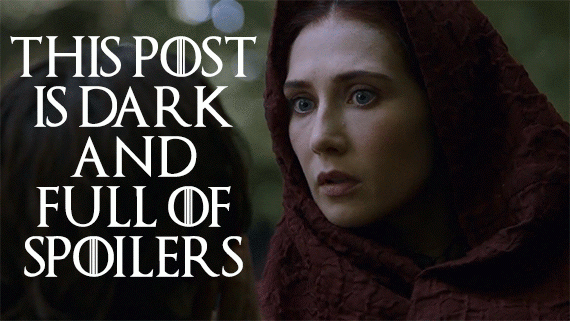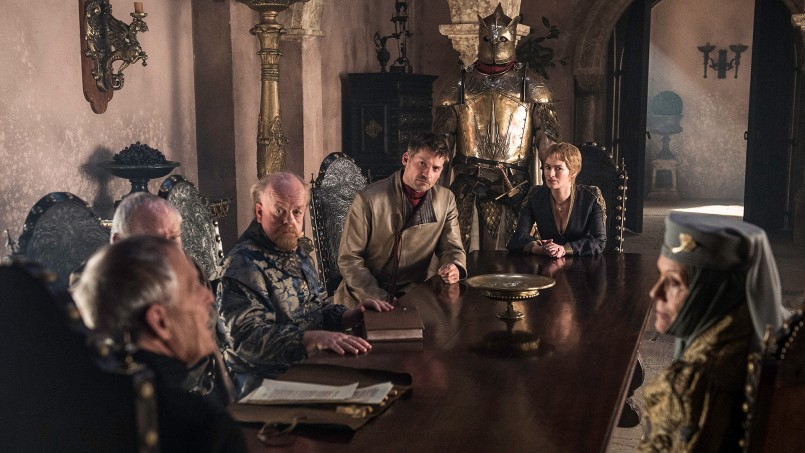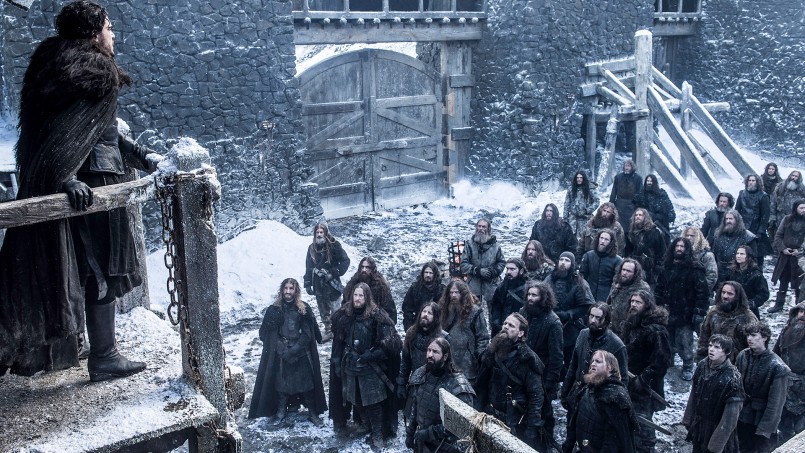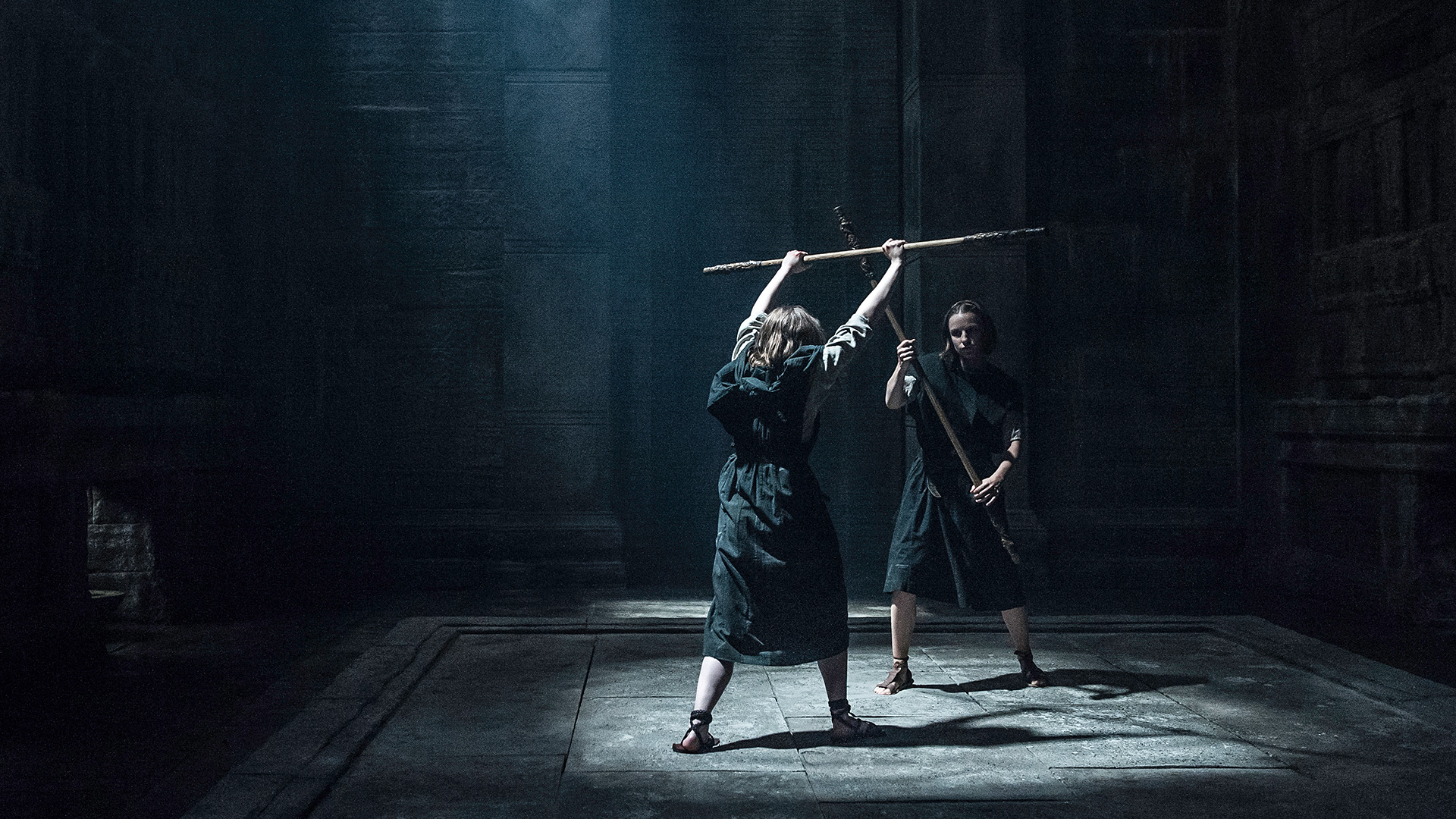Spoilers for the latest episode of Game of Thrones are ahead, so if you aren’t caught up with “Oathbreaker,” feel free to take care of that now. I’m fine waiting – I can use the time to go and fail again.

Over the course of its 5+ season run, Game of Thrones has been a show that puts great care into the deliberate pacing of its episodes, taking time to build up characterization and tension so that the stakes feel real when the conflict inevitably comes. This is a credit to the showrunning wizardry of David Benioff and DB Weiss (who also wrote this episode), as well as their entire production and writing teams. Unlike many other contemporary shows that deal in drama as well as action, Game of Thrones takes its time to tell its story, placing a premium on the slow build, which inevitably leads to a more immersive and believable viewing experience when the big action set pieces and character-defining moments show up. In some cases, we’re still waiting for payoffs for things that were set up way back in Season 1. This is excellent long-form storytelling; it challenges its viewers to pay close attention to each episode, and it rewards that attention when seemingly disparate story threads come together.
Now that we’re three episodes into its sixth season, it looks like Weiss, Benioff, & Co. are ready to start paying everything off in big, big ways. For several seasons, we’ve watched as most of the main characters – from the Starks to the Lannisters to the Targaryens (and everyone between, big and small) – disperse out into the wide and wicked world of Westeros and beyond. Lots of them have died. But now that we’re getting into the final stretch of the series, the characters who still live need to start coming back together – especially the Stark siblings. Winter, after all, is coming. “Oathbreaker” takes great strides in doing just that, and I, for one, am very excited at what’s to come. Let’s get started.
MEEREEN
Is it just me, or has the plot in Meereen gotten a whole lot better since Tyrion and Varys showed up? It’s still the most tedious plot line in the show right now, but I think we’re moving in an interesting direction now that Varys has spoken with Vala, the prostitute working in conjunction with the Sons of the Harpy. Vala’s contempt for Daenerys is logical and understandable when considered from her perspective; to her and her people, The Second Sons and Unsullied are nothing more than an occupational force that is systematically destroying Meereen, both as a physical place and as a culture. I appreciate this complication, because it reminds us that ruling a city or region always comes with collateral damage, even when a given ruler (and even one as fundamentally compassionate as Dany) has their best intentions at heart.
We also learn that the previously liberated cities of Astapor and Yunkai have not only reverted back to the slave masters, but that the cities have united in an effort to reclaim Meereen for themselves as well. I have to wonder how much the inevitable conflict between these cities and Meereen will add to the overall narrative; it’s no secret that I think Dany’s storyline has been the most tedious of any in the show, and to throw in this inter-city conflict feels like more wheel-spinning that’s keeping her (and, by extension, Tyrion and Varys) from getting to Westeros. All I’m saying is that I really hope that whoever burned down Dany’s fleet of ships gets what’s coming to them.
KING’S LANDING

After hearing about Varys’s “little birds” for several seasons, it was somewhat depressing (yet wholly unsurprising) to learn that at least part of their number consists of starving children. Qyburn has gathered them to provide them with the same sorts of treats that Varys did, so that he may cast out a net to track down anyone who, to paraphrase Cersei, mean to make their own political gains by exploiting the losses of the Lannisters. If Qyburn makes up the intellectual arm of the fledgling Lannister machine, then Ser Gregor (aka FrankenMountain) makes up the muscle, which just might give Cersei the strength she needs to keep her head above water long enough to see the heads of those who would oppose or betray her placed on spikes on the ramparts of King’s Landing.
It was a hoot to see the Small Council, headed by Kevan Lannister, disrupted by Cersei, Jaime, and Ser Gregor. Mace Tyrell has made it safely back from his presumably failed diplomatic mission to Braavos (the same can’t be said for Ser Meryn), and it seems that Lady Olenna is serving the council in some capacity. And is it wrong that I was secretly hoping that Ser Gregor would mash Maester Pycelle’s head, for good and for all? This scene did a great job of showing that, while the Lannisters have many enemies waiting for their moment to pounce, they also have as much (or more) strife within their own cadre.
This strife is compounded by the fact that the High Sparrow is working his wizened mojo on young King Tommen, reminding him that the best leaders take their council from men through whom the gods speak. Though he’s possessed of a religious zeal unmatched by any other character we’ve met in the show, the High Sparrow also has the ability to impart grandfatherly wisdom to a degree that can easily endear him to someone as young and inexperienced as Tommen. And if he gets Tommen in his pocket, there’s little that the High Sparrow can’t accomplish, which could very well spell doom for Cersei.
CASTLE BLACK

After Jon Snow’s return from death last week, the big question on everyone’s mind was what he would do next. In “Oathkeeper,” we get that answer (or, at least, the beginning of that answer). When Melisandre asks him what he saw while dead, Jon tells her “nothing,” and as such, Jon now knows that there is no purpose to life beyond what one makes of it (which must be vindicating for Jon; as it turns out, knowing nothing means knowing quite a lot). After unceremoniously hanging the traitors who killed him, Jon gives his Lord Commander furs to Dolorous Edd, telling him to wear it or burn it; either way, Jon is done wearing it, as well as the Lord Commander mantle. In short, Jon’s watch has ended, and he will now follow his heart rather than his honor.
Was anyone else surprised that only four of the traitors were put to death? I wasn’t counting, but there were far more than four brothers who shivved Jon at the end of last season. Thorne’s execution makes sense (though I’ll miss his smug crassness, as well as actor Owen Teale’s delectably devious portrayal), as does that of the First Builder and First Steward, but young Olly’s death felt excessive. It’s true that Olly is one of the most hated characters in the series’ history (enough so that actor Brenock O’Connor has received real-life death threats), but for him to be at the gallows while other traitors were not left me feeling like Jon was being uncharacteristically vindictive. While this action goes against the qualities of the Jon we once knew, we also need to remember that the price of his resurrection may have come at the price of his fundamental humanity (though he can still laugh at dick jokes, even when they’re at his expense). All I know is that Jon is ready to kick some serious ass.
CLOSING THOUGHTS

- Book readers and tin-foil theorists alike rejoiced at Bran’s flashback, which showed the legendary sword fight outside the Tower of Joy. We got to see the most celebrated knight in Westerosi history – Ser Arthur Dayne, the Sword of the Morning – in action, and it was a hell of a sight to behold. And while we now know that the fight ended differently from how the story came to be told (once again affirming that history is indeed written by the winners), the scene ended before Ned could make his way to the top of the tower and provide us with the answer we’re really waiting to know.
- It was great to see Sam and Gilly again, and by the sound of it, it seems they’re indeed on their way to Oldtown (and the Citadel) by way of Horn Hill, Sam’s home town. I have a feeling we’ll be meeting Randyll Tarly, Sam’s father and one of the greatest battle commanders to ever live. We know that Randyll despised Sam for his bookish nature and forced him to take the black so that he could never become the head of House Tarly, so don’t expect a warm welcome when Sam knocks on his door.
- Well, now we know that Smalljon Umber has as much of a potty mouth as his father, which was shown in his interaction with Ramsay Bolton. I had always assumed that the great houses in the North would always back the Starks, but in the last two episodes, we’ve learned that both the Umbers and the Karstarks have their reasons for wanting “new blood” to rule the North. And now that Rickon Stark is a prisoner (or, dare I say, play-thing) of Ramsay, rather than a ward of the Umbers of Last Hearth, I have a feeling things are going to get worse for the Starks before they get better (they will get better, won’t they?).
- For several seasons, Daenerys’s arc has felt like the cinematic equivalent of an arm-bar. Now that she’s under the control of the Dothraki once again, I can’t help but feel that her story is going in circles. I don’t really care what happens with her, so long as she’s on a ship (or dragon) and heading for Westeros by the end of the season.
5/5 stars: “Oathbreaker” puts the story on a fast-paced trajectory that begins to pull disparate story lines back together.



